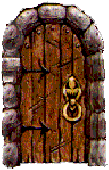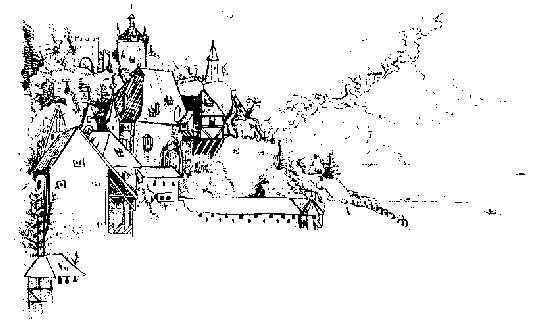 Something is there that doesn't like Macbeth. Although it's one of Shakespeare's most frequently-produced plays, nobody ever produces it without crossing his or her fingers. Where will The Curse strike this time?
Something is there that doesn't like Macbeth. Although it's one of Shakespeare's most frequently-produced plays, nobody ever produces it without crossing his or her fingers. Where will The Curse strike this time?
As any actor will tell you, Macbeth is the theatre's unluckiest play-a play you don't want to play around with. Not only is it bad luck to quote the script in the dressing room (even during the run of another show), it's absolutely forbidden to utter the title. It is "the Scottish play" and don't you forget it.
Actors adore this taboo. It's one of those little rituals that prove you're a real theatre person. Besides...one never knows. Not that there's literally a curse on "the Scottish play," of course, but strange things do seem to happen when it's on the boards.
The legend starts with the play's very first performance in 1606. Hal Berridge, the boy actor who was to play Lady Macbeth, is said to have died during rehearsals, to be replaced by Shakespeare himself.
True, that's legend. But it's a fact that during a 1735 performance of Macbeth the great British actor, Charles Macklin, got into a backstage scuffle with another actor and accidentally killed him. (Macklin was apparently still steaming from some very bad reviews.)
Fast-forward to America in 1849, a period when theatre fans were as rabid as soccer fans are now. Two eminent Shakespearean actors were presenting rival productions of the same classic in New York-Edwin Forrest, an American, and William Macready, a Brit. Their groupies brawled outside the Astor Place Opera House. The militia fired into the crowd and two dozen people were killed. The play? Macbeth.
Fast-forward to Oldham, England, 1947. An actor named Harold Norman is giving a splendid opening-night performance as Macbeth for the Oldham Repertory Theatre. "Lay on, MacDuff!," he cries-and takes MacDuff's steel in the gut. He dies a month later of peritonitis.
Now it's the late 60s. A young St. Paul actor, George Ostroska, tells a friend at a party that he canšt wait to open in Macbeth, a role he has wanted to play all his life. A month later he opens-and suffers a fatal heart attack just before the banquet scene.
Eerie, no? Small wonder that the young actor who inadvertently mentions the play's title is ordered to whirl around three times, spit between his or her fingers and pray that the theatre gods weren't paying attention.
What's up with those gods anyway? Shakespeare wrote more than 30 plays. Why should Macbeth be the only one with a curse on its head?
One reason-according to Richard Huggett's definitive The Curse of Macbeth and Other Theatrical Superstitions (Picton Publishing, 1981)-is the play's ultra-sinister atmosphere. Huggett calls it "the murkiest, gloomiest and most despairing" of Shakespeare's tragedies. That could be debated. Think of the eye-gougings in King Lear; the yukky meat pies in Titus Andronicus; the body-count in Hamlet. In Macbeth there's at least somebody alive at the end of the play.
What's beyond debate is the play's emphasis on witchcraft. Scholars generally agree that Macbeth was a commissioned piece, written to honor Shakespearešs new patron, King James I, a Scotsman and an ardent demonologist.
Those cackling hags confronting Macbeth and Banquo on the heath would have riveted James' attention, particularly since Banquo was supposed to have been an ancestor of his.
Double, Double, toyle and trouble,
Fire burn and Cauldron bubble.
Coole it with a Baboones blood,
Then the charm is firme and good...
Great local color. Where did it come from? No one really knows. Some authorities think that the witchcraft scenes were punched up by adapters after Shakespeare's death. Not Huggett. He suggests that Shakespeare was drawing on memories of the Stratford countryside, where witches-that is, addled old women who trafficked in magic spells-were not unknown. Not only did he remember one such spell from his youth, he reproduced it.
From its opening lines, then, "the Scottish play" literally (if inadvertently) summons to the theatre a horde of spirits who do not wish human beings well. Thus the playšs long record of mischief.
Sensible people will find this theory hard to swallow. They'll explain the so-called "curse" in terms of modern psychology. Perception, they'll remind us, is reality. Tiptoe around a house as if it were haunted and unexplained psychic phenomena will occur. So will the ordinary things that go wrong with a house. Many anecdotes meant to illustrate the Macbeth curse wouldn't raise an eyebrow if they had happened backstage at As You Like It. People sprain their ankles, miss their entrances, go up on their lines and divorce their spouses all the time in the theatre.
It's also true that Macbeth teems with physical combat, much of it played in the dark. No wonder actors get hurt.
But why debunk a perfectly fine legend? "The Scottish play" is hexed: that's how theatre folk like it and that's how it's going to stay. How else, they ask, to explain the fact that so many fine actors have lost their powers in it: John Gielgud, Ralph Richardson and Peter O'Toole, to name three? (The latter's Old Vic performance in the early 80s was apparently so bad that people came from miles around to see it.) Charles Laughton also failed in the role. Lilian Baylis, the Old Vic's eccentric impresario, who hadn't wanted Laughton in the first place, came round after the show with these comforting words: "Never mind, dear, you did your best and I expect that one day you'll make quite a good Macbeth."
That was in 1933. Four years later the Old Vic did "the Scottish play" again with Laurence Olivier. Rehearsals were calamitous, but Olivier came through with a magnificent performance. After the show, Miss Baylis' secretary delivered him this note: "Welcome return to dear Laurence Olivier. May you be as happy in Macbeth as in Hamlet last season."
The note gave Olivier no joy at all; Miss Baylis had died two days before.
It makes you wonder.
Dan Sullivan is associate director of the National Critics Institute at the OšNeill Theatre Center in Waterford, CT.


